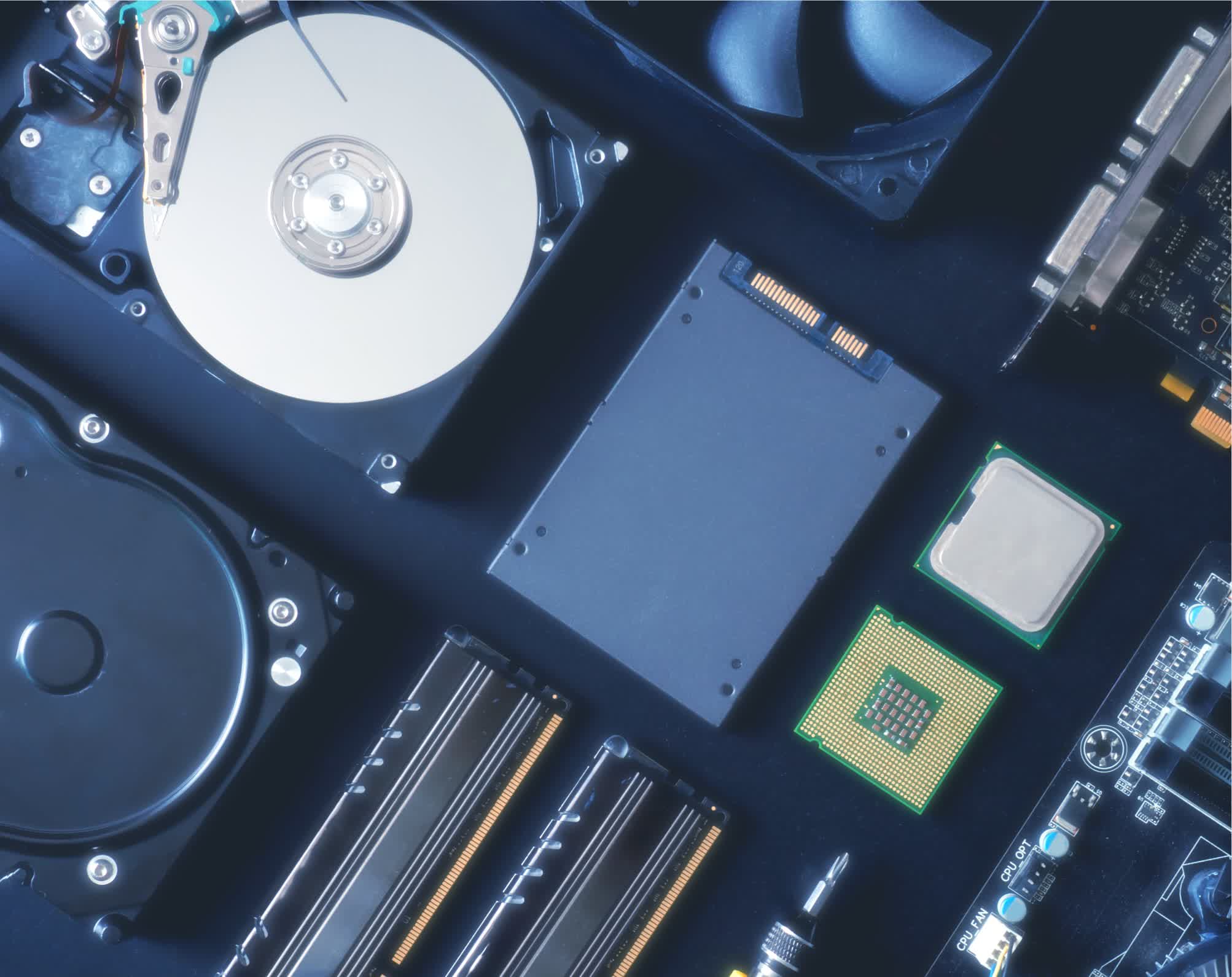See our latest update to this buying guide: The Best SSDs and Storage
Fast storage has become a true commodity* and hopefully it will only get bigger and faster. Today's best choices are differentiated by how extreme you want to go and how willing you are to pay for the very best. For new builds, NVMe drives have become the norm as prices continue to fall.
Enthusiast and pro-level SSDs are reserved to non-volatile storage which carry a premium, but are certainly worth the money if you run applications that fully take advantage of the 2x performance bump. For everybody else, mainstream SSDs are affordable and speedy, offering good capacity and endurance. Our best storage picks are divided into six categories based on form factor and intended use as shown below.
- Best High-Performance SSD
- Best Mainstream SSD
- Best Hard Drive
- Best Portable Storage
- Best External Storage
- Best Home NAS
Best High-Performance Enthusiast SSD
Sabrent Rocket 4 Plus PCIe 4.0 SSD
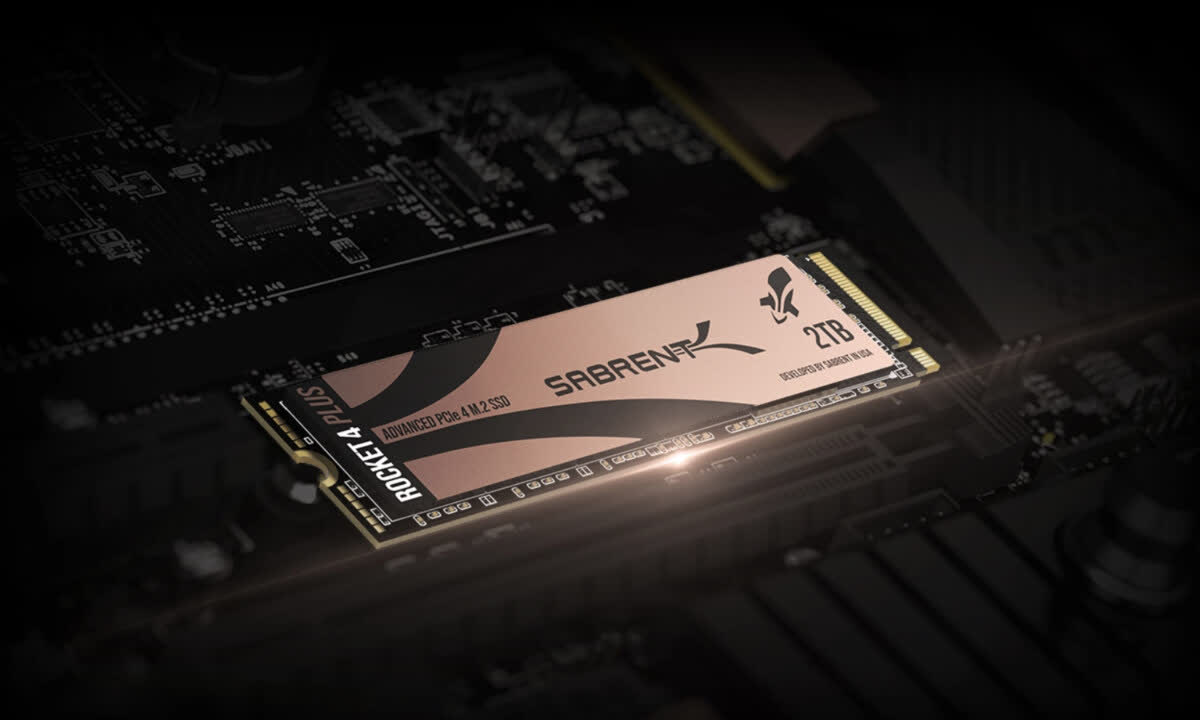
Sabrent gave the Rocket 4 a nice boost with the Plus model. In our testing, this drive was able to get the closest to its class-leading, officially rated transfer speeds of 7,100 MB/s reads and 6,600 MB/s writes, making it the fastest consumer drive currently on the market. Although real-world testing sees it leapfrog competitors by the minutest of margins and vice versa, you get to keep the bragging rights with the Sabrent drive.
Like its predecessor, the value proposition of the Rocket 4 Plus remains unmatched, starting at $90 for the small 500GB version and $150 for the 1TB model. On the plus side (geddit?), the newer drive is now offered in 4TB and up to 8TB capacities, allowing you to store massive game libraries, work files, and other stuff, all in one place. You'll need $700 for the 4TB version and a whopping $1,500 for the privilege of owning the biggest Rocket, but then your pockets are probably deep enough to afford a PCIe 4.0 motherboard and accompanying hardware that's required to take full advantage of this drive.
It's not a complete home run for Sabrent because in terms of endurance, the less capacious Rocket 4 Plus sees a noticeable downgrade compared to its predecessor. Despite both drives being TLC-based, Sabrent rates the Plus 1TB version at 700 TBW (terabytes written), which is less than half of the 1,800 TBW for the non-Plus drive. Similarly, the 2TB Rocket 4 Plus is rated at 1,400 TBW, making it considerably less than the 3,600 TBW of the standard 2TB drive. The 4TB Rocket Plus offers a more generous 3,000 TBW rating and the massive 8TB drive goes to 6,000 TBW.
The only comforting factor here is a MTBF (mean time between failures) of 1.6 million hours and Sabrent's 5-year warranty, which oddly enough, is only applicable if you register your drive and is otherwise fixed at just 1-year.
Just as great: Samsung 980 Pro
It's got the brand cachet and is no performance slouch either. The Samsung 980 Pro (read our review) is nearly as fast as its competition, edging out the aforementioned Sabrent Rocket 4 Plus in our file copying tests. Samsung has gone for aggressive pricing this time around, with the 1TB 980 Pro currently going for $200, just like its main rivals. The 2TB version, however, is $100 more expensive than the Sabrent equivalent.
Samsung offers impressive 6,700MB/s read and 2,700MB/s write speeds for just $80 if buyers opt for the 250GB base model. That's good enough for storing OS and primary applications, with capacious, faster versions (500GB, 1TB, and 2TB) also available for more demanding users.
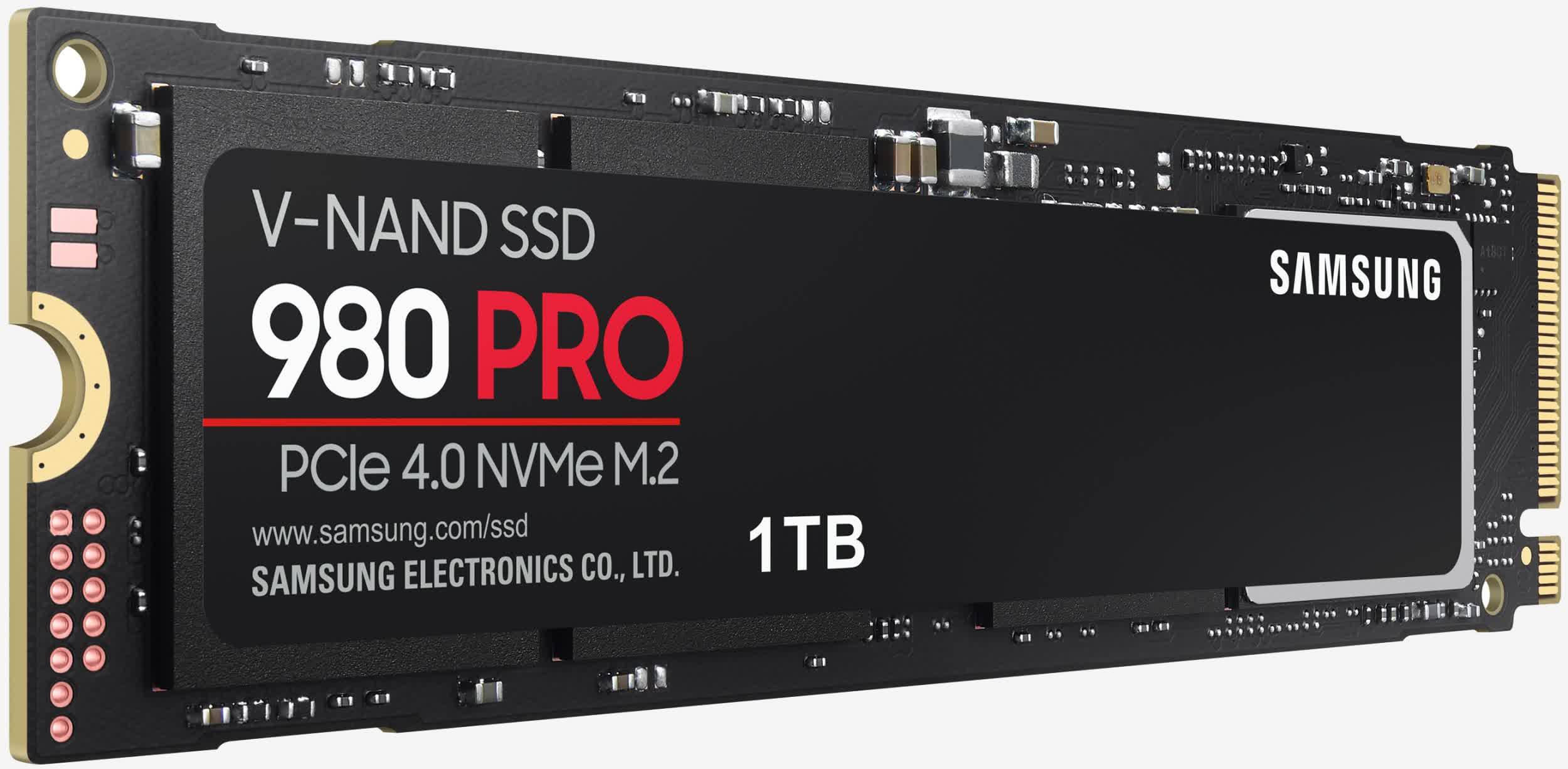
Like the Rocket 4 Plus, Samsung's 980 Pro also takes a hit to endurance. The drop is easier to figure out in this case as Samsung shifted from the 970 Pro's 2-bit MLC flash to denser, 3-bit TLC in the 980 Pro. This has led to a 50 percent reduction in Samsung's official TBW ratings for this model over the older 970 Pro, coming in at 150TBW/250GB, 300TBW/500GB, 600TBW/1TB, and 1,200TBW on the flagship 2TB drive.
These figures are lower than Sabrent's and are accompanied by a slightly worse MTBF rating of 1.5 million hours. However, Samsung also offers a 5-year warranty on its drives, with another positive being its well-built and mature Magician SSD software.
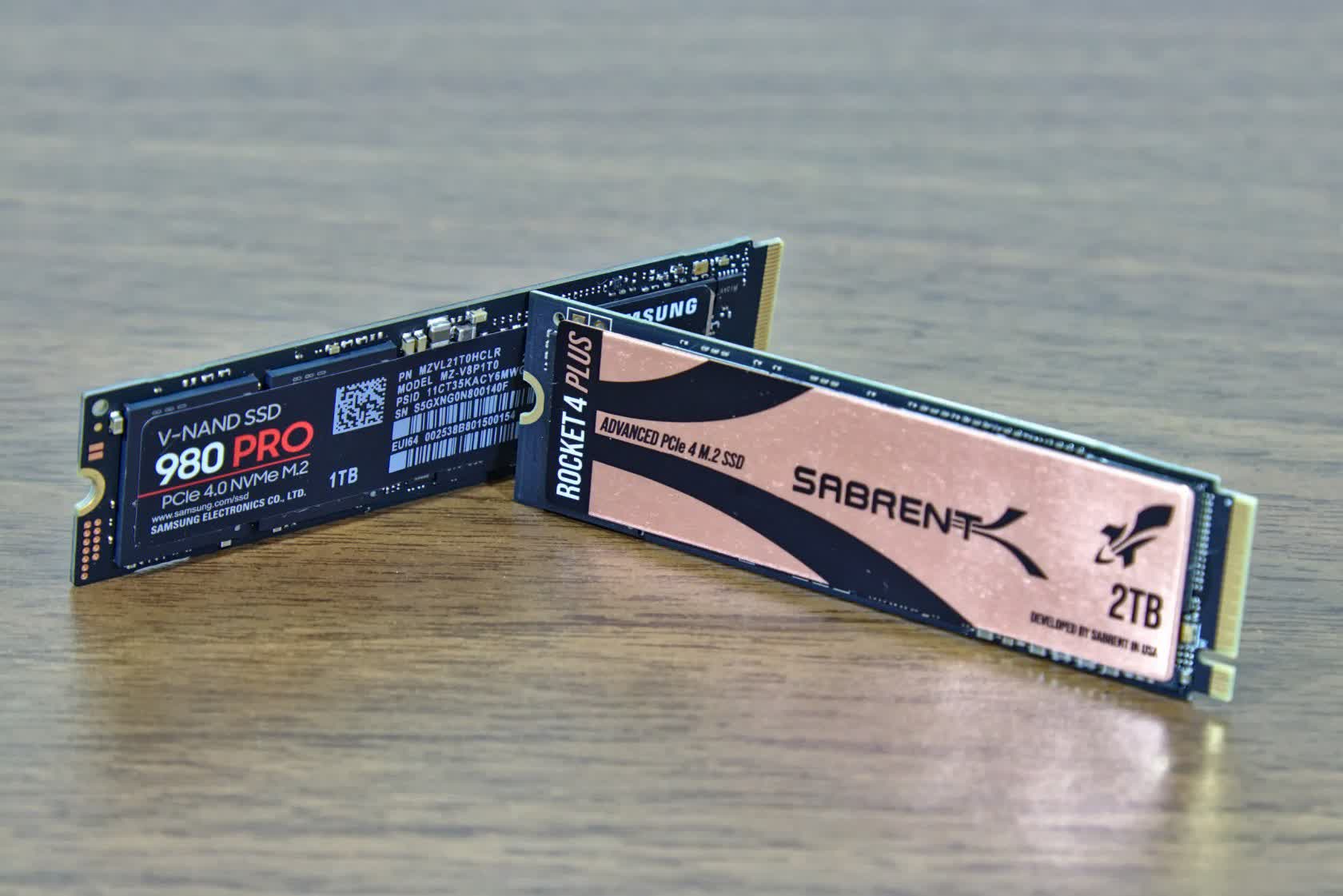
It's worth mentioning that both, the Sabrent Rocket 4 Plus and the Samsung 980 Pro are top-tier SSDs, and enthusiasts looking for the ultimate speedy storage solution can't go wrong with either. The differences come down to their official TBW endurance rating, where Sabrent leads Samsung, and how they approach value.
Samsung makes it easier to get onboard by offering a cheaper, slightly slower 250GB base model, and has a lot more brand recognition and track record in the storage business.
Honorable mentions
While Sabrent and Samsung are our top picks for this category, rivals from WD and Crucial are not far behind. WD's SN850 is a blistering performer, though you may need to spend extra on a heatsink as it has been noted to get fairly warm under heavy loads. At $130, the drive's 500GB model is currently priced to match the Samsung 980 Pro and is just $10 more for the 1TB version.
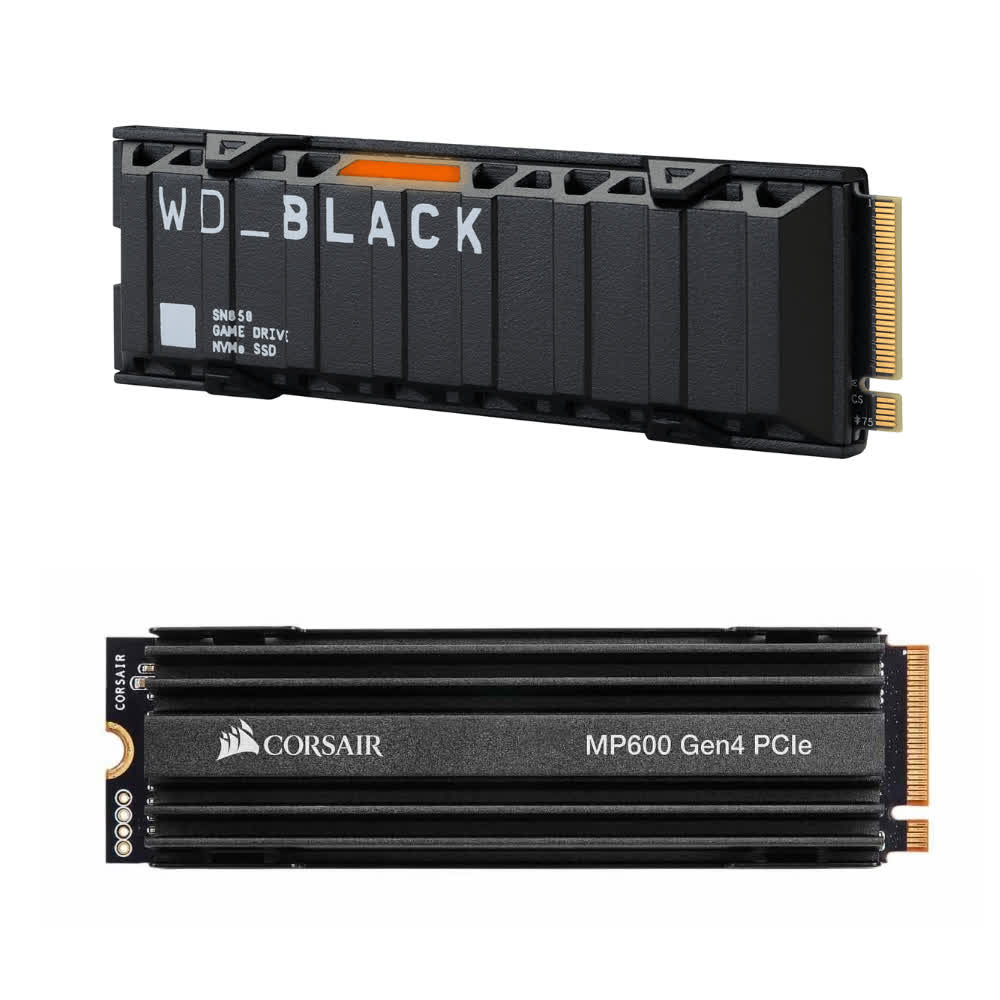
The Crucial MP600 is another solid PCIe 4.0 SSD that offers the lowest price of admission amongst competitors, starting at just $100 for 500GB and $175 for the 1TB model. It won't be touching the ~7,000MB/s peak transfer rates of its rivals, but most are likely to find its max 4,950MB/s reads and 4,250MB/s writes perfectly adequate for daily use.
Best Mainstream SSD
WD Black SN750 SSD

The WD Black SN750 is a formidable high-performance NVMe drive that won't break the bank. While it's been Samsung commanding our top SSD lists in recent years, competition from the likes of WD, Corsair, Sabrent, Crucial, and a few others has been felt for some time, leading to great value alternatives that deliver comparable performance and excellent reliability.
The Black SN750 is now also available in 4TB capacity, adding to a wide range of models that include 250GB, 500GB, 1TB, and 2TB variants. Pricing starts from $50 for the 250GB version and maxes out at $800 for the 4TB model. The most popular 1TB version with up to 3,470MB/s read and 3,000MB/s write speeds is available for $145, which will save you a few bucks when compared with Samsung's competing 970 Evo 1TB that's currently going for $164.
The SN750 SSD uses the same controller, NAND, and hardware design from previous Black SSD models, which isn't a bad thing. The previous generations have a solid track record, but with WD's newer firmware, the SN750 can push further with faster sequential transfers and good latency. This iteration also allows for adding a heatsink for enthusiast users worried about cooling or throttling issues. The drive's thermal performance is just fine regardless, and overall it's one of the best mainstream SSD options.
When we said SSDs are now a commodity, we were not only referring to affordable mainstream models, but even top-tier NVMe are hard to differentiate. Along with the WD Black SN750, you can find good deals on the Corsair Force MP510, and the PCIe 3.0 Sabrent Rocket is also fantastic for the price. Even previous-gen models, like the 970 Evo (non-plus), WD Black NVMe, and HP EX920 are good buys if you get them at a discount since the performance difference is marginal on day-to-day tasks.
A trusted SATA option for upgrading older PCs and laptops
The always wallet-friendly Crucial MX500 is a proven affordable option if you want to upgrade an older PC that only supports the SATA interface. This group of consumer-grade SSDs is a great option for all kinds of uses, laptop upgrades, builders, and at this point even storage capacity upgrades.
The best performing SATA drives have already squeezed most they could from the interface a few years ago, so the speed differences are minor between the best models, if perhaps more consistent than they were before. Currently, you can buy a 1TB drive for as little as $98, or half a terabyte for $56.
Best Hard Drive
Seagate IronWolf NAS HDD
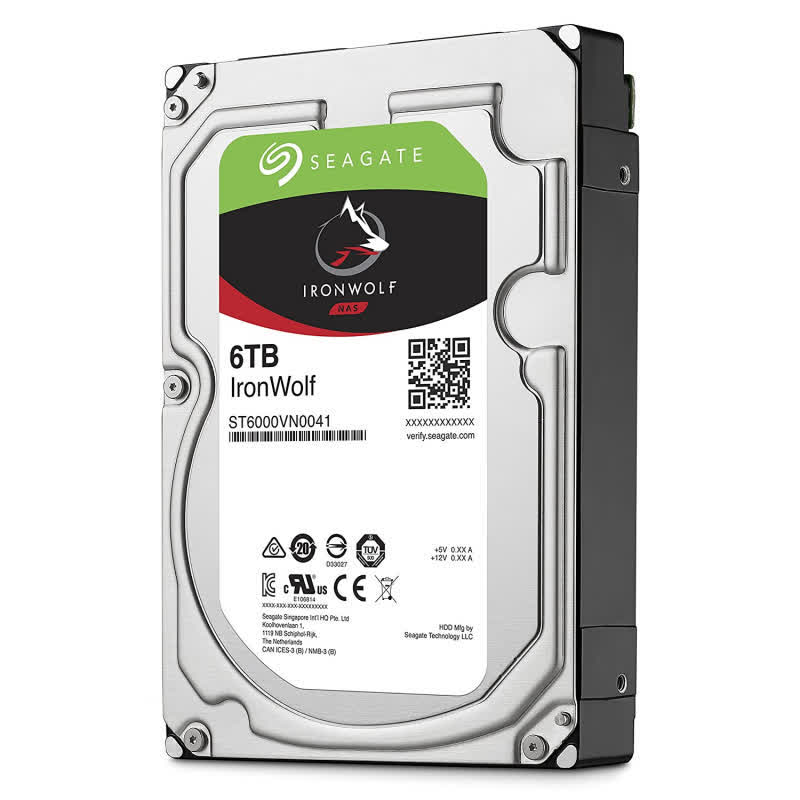
Seagate's IronWolf line of NAS drives remain unbeatable if you're in the market for a mechanical hard drive, looking to build a budget system or just want a ton of storage.
The IronWolf drives are state of the art as far as consumer hard drives go, leveraging PMR (perpendicular magnetic recording) platters running at 7200 RPM to cram up to 16 terabytes of data in a regular 3.5-inch form factor drive. Being NAS drives, the IronWolf series doesn't come cheap as it's designed to withstand performance-intensive workloads involving constant read/write operations for days on end. They are, however, more reliable as a result, come in higher capacities, and perform well (for a hard drive).
You can find IronWolf HDDs in capacities ranging from 1TB to 4TB (5900 RPM), while larger 6/8/10/12/14/16TB models are all 7200 RPM. Moreover, these drives utilize conventional magnetic recording (CMR) technology instead of "shingled magnetic recording" (SMR), so you won't get the write performance penalty associated with SMR, which manufacturers employ to produce cheaper, denser disks.
The IronWolf series is entirely CMR-based and gets our top recommendation for buying a new HDD. Inevitably, this also means paying a small premium over budget drives. For example, an 8TB IronWolf drive will set you back around $200, while an identical capacity BarraCuda can be had for $140.
Worthy alternative: WD Red Plus
WD added a 'Plus' tier to its Red series of 3.5-inch NAS HDDs following the SMR/CMR controversy. These CMR drives have been competitively priced with Seagate's IronWolf series across their entire range of 2/3/4/6/8/10/12/14TB models. There are, however, minor spec differences between the two, including RPM speeds and cache size.
WD's Red Plus drives generally have more cache across same-capacity models, however, Seagate's IronWolf range comes with a 5-year warranty, unlike WD's 3-year warranty for the Red Plus series.
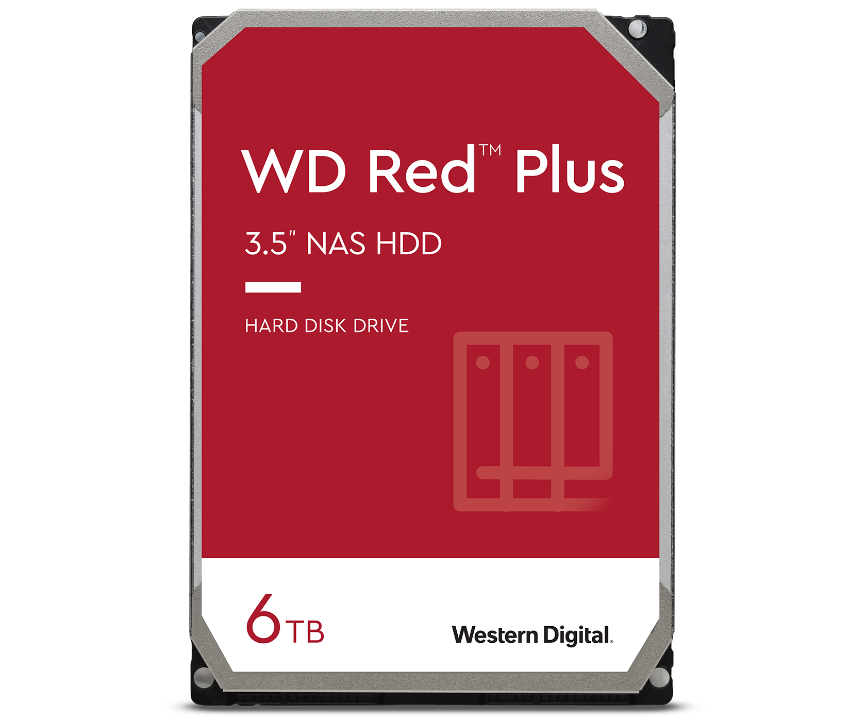
Disk drive budget option
If you just want an inexpensive, barebones HDD, the Seagate Barracuda line has a variety of options to get you the most storage for your money. A capacious 2TB model can be had for just $53, or you can double the space with the $85 4TB version. The BarraCuda is also available in 3TB, 6TB, and 8TB variants.
The 1TB and 2TB models of the BarraCuda are 7200 RPM which are fast enough for a boot drive and moderate applications on top. The 3TB and above models slow down to 5400 RPM, but we think that's reasonable for the price. Another thing to like about this series is the 256MB cache; other value drives only have 64MB. A larger cache is useful for storing frequently used files without needing to keep them on the slower disk.
Best Portable Storage
Samsung T7 Touch
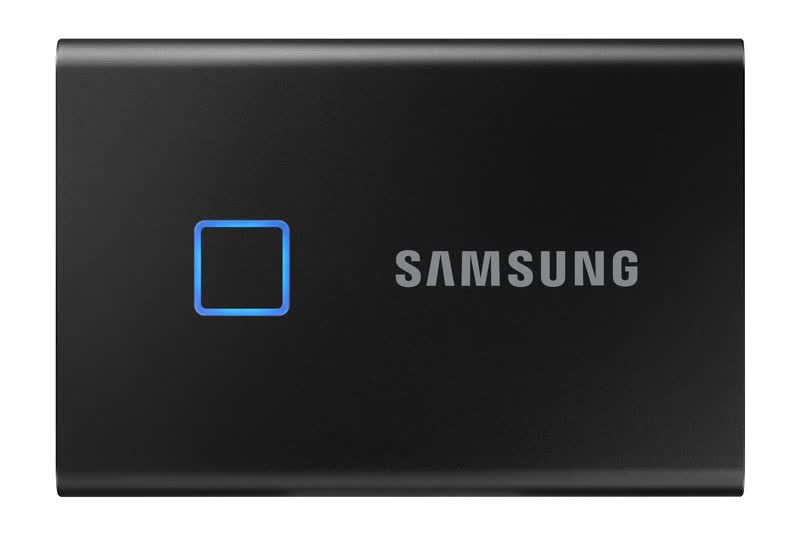
Having speedy storage on the go can be a lifesaver in some situations and a routine requirement in others.
You can't go wrong in this category with either the Samsung T5 or the newer T7 portable and T7 Touch. The older T5 is SATA-based but still offers respectable transfer rates for a portable drive with up to 540 MB/s reads and 515 MB/s writes, provided you have a compatible Type-C Gen 2 USB 3.2 connector.
The same limitation applies to the T7 and T7 Touch, except that the newer, more expensive drives come with PCIe NVMe flash inside and offer a ~50% jump in performance – up to 1,050 MB/s reads and 1,000 MB/s writes – inside a slightly taller, shock-proof metal enclosure that should survive the odd drop. Like the T5, these drives don't have an IP rating against water or dust resistance.
The three drives offer 256-bit hardware encryption, but the T7 Touch adds an extra layer of security with a speedy fingerprint sensor inside its square activity light. The feature adds $30 to the price over the standard T7, but having a fingerprint-locked SSD on your business trip or holiday might just be worth paying the slight premium. The device is encased in metal and is compact enough that it can fit in the palm of your hand or thrown in your pocket, measuring 85 x 57 x 8 mm.
The T7 and T7 Touch have a 3-year warranty, come in 500GB, 1TB, and 2TB capacities and are slightly more expensive than their closest rival, the Crucial X8. It is justifiable though, as Samsung's offerings feature faster, higher endurance TLC flash vs cheaper, denser QLC memory found inside the Crucial X8.
A worthy alternative: Crucial X8
The Crucial X8 gets all the basics right, delivering the most value for money with fast transfer speeds of up to 1,050 MB/s reads and similar writes, durable design, and compatibility for a wide range of USB-C and -A connected devices including PCs, gaming consoles, tablets, and phones.
Just be mindful of the USB 3.2 Gen 2 interface needed on the host machine for getting the most out of this drive and the fact that – like most SSDs – sustained writes on the Crucial X8 will limit its performance once the drive's SLC-based dynamic cache becomes full.

QLC flash enables denser storage and affordability to meet a variety of use cases, with the cheapest 500GB model currently going for just $70, while more capacious 1TB and 2TB models can be had for $125 and $271, respectively. All drives come with a 3-year warranty.
It's not without a few minor annoyances though, as the X8 doesn't have an activity light to let you know when the drive is being accessed, and the lack of any IP rating means having to be extra careful in harsh environments. Hardware encryption is absent, too, however, Windows Bitlocker, Apple's Filevault, and other software-based encryption tools are available for those concerned about security.
Honorable mention
The latest-gen SanDisk Extreme Portable SSD offers the same transfer rates as Samsung and Crucial rivals but adds durability for a very small premium. The drive's silicon enclosure is IP55 water and dust-resistant and is complemented by a 5-year warranty.
The 500GB model starts at $90, which is $10 more than the T7 Touch, while prices are identical across the 1TB versions. Between this and the Samsung T7, is a matter of choosing ruggedized portable storage over a premium-looking, compact SSD.
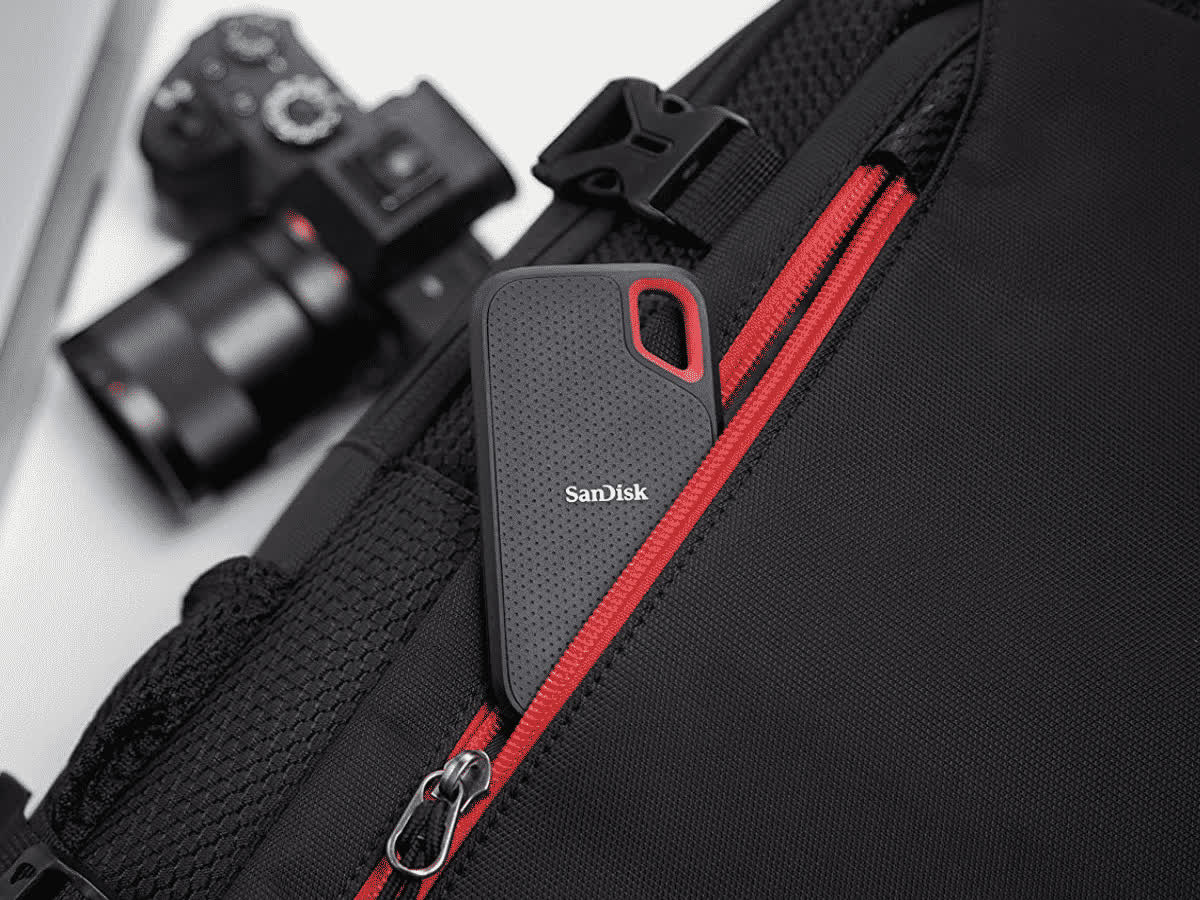
Need for Speed
On-the-move professionals and enthusiasts looking to transfer hundreds of GBs of data regularly would fare off better with faster, costlier options like SanDisk's Extreme Pro, whose upgraded version can reach up to 2,000MB/s, or Samsung's Thunderbolt-3 capable X5 portable with blazingly fast 2,800 MB/s reads and 2,300 MB/s writes. The rest, however, will find the Samsung T7 or Crucial X8 easily meeting their expectations, if not exceeding them.
Best External Hard Drive
Western Digital My Book USB3
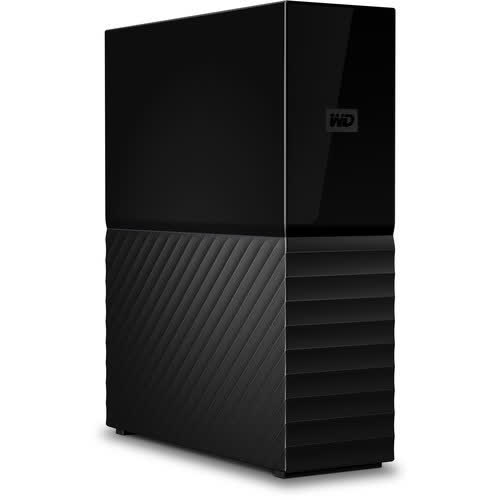
The cost and capacity advantages of mechanical hard drives become more appealing when it comes to storing data outside of your PC. Backups, media and other important files can often take TBs of space and need to be stored externally for safety. To that end, WD's My Book stands out above the competition by offering lots of reliable storage space on the cheap.
There are plenty of storage options to choose from, ranging between 3TB to 18TB. You can get a 4TB model for just $89 or a capacious 12TB drive for $249. Those with even higher storage requirements can opt for the Duo version that offers up to an insane 36TB of storage space for $2,640!
My Book comes with the exFAT file system by default, alongside WD's Backup software for Windows/Mac PCs, and is also compatible with Apple's Time Machine. With a slow spinning disk and a USB 3.0 interface, this drive won't be winning any speed contests with mediocre 170-180MB/s sequential reads and writes, and even slower random transfer and I/O performance. Although these speeds are unacceptable on a boot drive or another internal disk, you are unlikely to be loading applications or games from the My Book, where its main purpose is offering cost-effective, reliable storage for your less frequently accessed data.
There are a few additional, but minor quirks with the My Book. It uses a Micro-B USB 3.0 connector (to USB-A) unlike USB-A/USB-C interfaces that have now become more commonplace. The drive doesn't have an activity light and needs a separate (included) 12V power adapter to work, making it better suited for users with fixed workspaces. WD's My Book comes with password-protected 256-bit hardware encryption and a 3-year warranty, which is longer than its Seagate rival and overall makes it the best, inexpensive external storage currently available.
Worthy alternative: WD My Passport Ultra
For those looking to get portable storage on a budget, WD's My Passport Ultra hits the middle ground in terms of capacity, performance, portability, and price. With a sleek, pocket-friendly design, you can get a 2TB My Passport Ultra for $80 or 4TB for $130, with the drive rounded off by two more (1TB and 5TB) options. This model uses a modern USB-C port (USB-A adapter included) and features other niceties such as an activity light, onboard hardware encryption, useful software utilities, and a class-leading 3-year warranty.

Performance of the My Passport Ultra is nothing to write home about, but its ~130MB/s read and write speeds are on par with the competition and easier to accept considering the price, features, and daily usability.
Best Home NAS
Synology DS220+ 2-bay USB3

It's now more affordable than ever to setup a Home NAS for your file sharing and media needs. Synology's latest $300 DiskStation DS220+ diskless makes the best case for itself in this category, offering the most value for entry-level Home NAS users.
This DS220+ comes with two empty drive bays, supports up to 32TB of max storage for 3.5/2.5-inch SATA HDDs and 2.5-inch SATA SSDs, with transfer rates of up to 225MB/s reads and 192MB/s writes. It packs more powerful internals than its predecessor, including a dual-core Celeron J4025 chip, 2GB of DDR4 RAM (expandable up to 6GB), 2 x 1Gb LAN ports with link aggregation and 2 x USB 3.0 (5Gbps) ports. There's also support for 4K transcoding for high quality media streaming, while RAID types include SHR, Basic, JBOD, RAID 0 and RAID 1.
An m.2 slot is still lacking here though, which means you'll need to shell out more for costlier alternatives like the 2-bay DS720+ if faster, NVMe-cached storage is a priority. There's also no support for an expansion unit to add more storage down the road. These are the DS220+'s only key weaknesses at this price point. However, Synology's class-leading DSM OS makes up for its hardware shortfalls and keeps it ahead of rivals in terms of the software experience, making the DS220+ our top pick in the Home NAS category.
Upgrade to 4-bays
Our previous top choice in the NAS category was a more expensive Synology unit with 4 bays. However, given the spotty availability of the great DS420+, you may want to consider the $440 Asustor AS5304T diskless, which stands out as a capable 4-bay Home NAS solution with support for up to 72TB of raw capacity and an expansion unit for 256TB of space.
It's powered by a quad-core Intel Celeron J4105, features 4GB DD4 RAM (expandable up to 8GB), 4GB flash memory, dual 2.5 GbE ports with link aggregation support and 3 x USB 3.0 (5Gbps) ports.

An m.2 slot for NVMe cache is absent here, too, but at least there are more bays here to sacrifice for a speedy SATA SSD. Alongside 4K streaming, the Asustor Data Manager (ADM) software has the basics covered with decent app support, including third-party Plex media server to make it a solid 4-bay Home NAS for streamers.
Masthead credit: Ekkaphan Chimpalee
